Micro-learning offers powerful 5-minute lessons that fit into your busy schedule and boost learning retention. By focusing on a single objective and using engaging strategies like visuals or quizzes, you keep things simple and effective. Short sessions prevent overload, increase motivation, and make learning enjoyable. Using tools like mobile apps or interactive platforms can elevate your experience. Keep exploring to discover how integrating micro-learning can transform your skill-building and daily growth.
Key Takeaways
- Micro-learning breaks complex topics into short, focused 5-minute lessons to boost retention and engagement.
- Effective 5-minute lessons target a single clear objective, using visuals, questions, or activities to enhance understanding.
- Short sessions prevent cognitive overload, making learning more efficient and increasing motivation.
- Mobile apps and interactive platforms facilitate accessible, multimedia micro-lessons anytime and anywhere.
- Incorporating micro-learning into daily routines fosters consistent growth and supports long-term skill development.
The Rise of Micro-Learning in Today’s Education Landscape
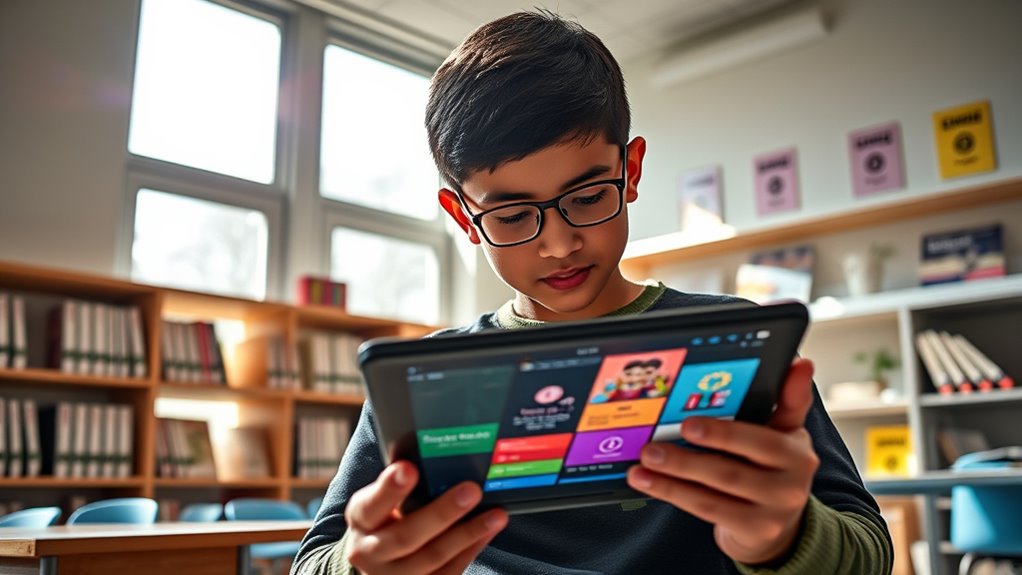
In recent years, micro-learning has gained significant momentum in today’s education landscape, driven by the need for more flexible and efficient learning methods. This approach caters to busy learners by breaking complex topics into short, focused lessons. As a result, you experience better learning retention because information is easier to digest and remember. Additionally, micro-learning boosts learner engagement by providing quick, interactive content that keeps your attention. Unlike traditional lengthy lessons, these bite-sized modules fit seamlessly into your daily routine, encouraging consistent learning habits. The rise of digital platforms and mobile access further enhances its popularity, making micro-learning an effective way to acquire skills and knowledge in a fast-paced world. This trend is transforming education by making learning more accessible and impactful. Moreover, micro-learning aligns with personalized in-home care principles by enabling tailored, efficient education that fits individual needs and schedules.
Designing Effective 5-Minute Lessons
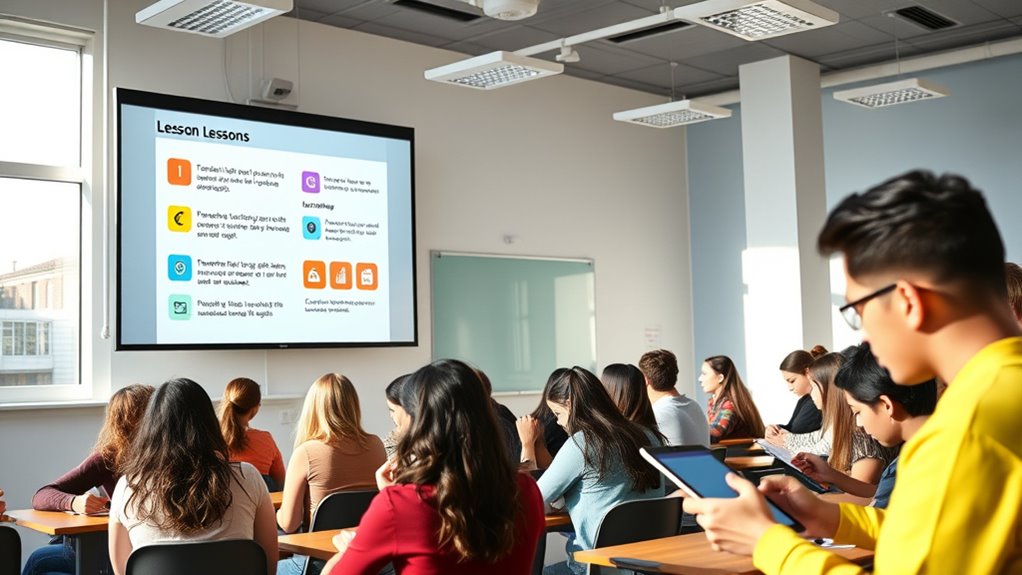
To design effective 5-minute lessons, focus on delivering a single, clear learning objective that captures the essence of what you want learners to grasp. Keep content concise and targeted to maximize memory retention. Use engagement strategies like questions, visuals, or quick activities to maintain interest. Break concepts into small, digestible parts, emphasizing key points. Incorporate repetition or summaries to reinforce learning. The following table illustrates ideas to enhance your lesson:
| Focus Area | Tips |
|---|---|
| Learning Objective | Keep it specific and measurable |
| Engagement Strategies | Use questions, visuals, or mini-quizzes |
| Memory Retention | Repeat key points, summarize at end |
| Content Delivery | Be concise, avoid overload |
Additionally, incorporating powerful persuasive words can significantly enhance the impact of your teaching by capturing attention and motivating learners.
Benefits of Short, Focused Learning Sessions
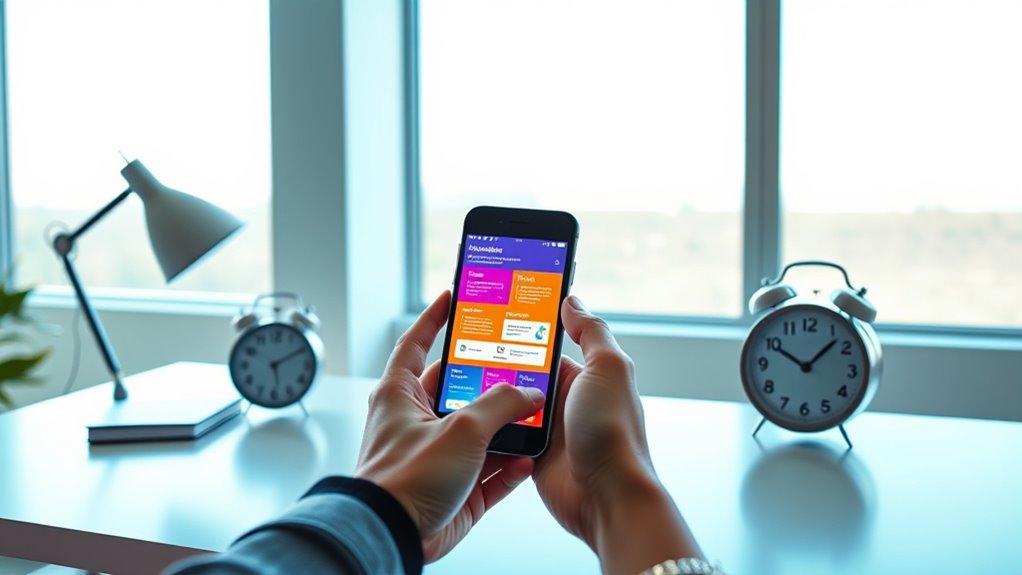
Short, focused learning sessions deliver multiple benefits by making training more efficient and engaging. When lessons are brief and targeted, you’re more likely to stay attentive and absorb information effectively. These sessions boost cognitive retention because they prevent overload, allowing your brain to process and remember key concepts better. Additionally, focused micro-learning keeps you engaged, reducing boredom and increasing motivation to learn. The bite-sized format encourages active participation, as you can easily fit these lessons into busy schedules. By concentrating on specific skills or topics, you gain clarity and confidence faster. Furthermore, understanding the importance of contrast ratio in projectors helps you appreciate how visual quality impacts learning environments. Overall, short, focused sessions optimize your learning experience, making it easier to retain knowledge and stay motivated to continue developing your skills.
Tools and Platforms for Micro-Learning
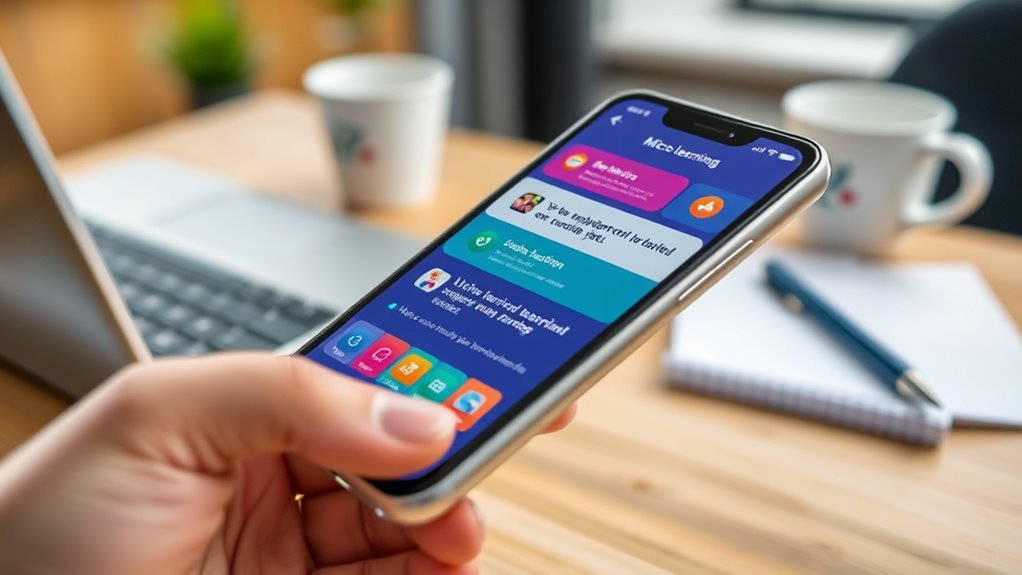
Have you ever wondered which tools can make micro-learning more effective and accessible? Mobile apps are a popular choice, allowing you to learn anytime, anywhere. Many platforms feature interactive quizzes that reinforce key concepts and keep you engaged. These quizzes provide instant feedback, helping you identify areas for improvement. Platforms like Kahoot!, Quizlet, and Edpuzzle integrate multimedia content, making lessons more dynamic. Social learning features enable collaboration and discussion, enhancing retention. Some apps offer gamified elements to motivate you further. By leveraging these tools, you can customize your learning experience to fit your schedule and preferences. Whether you’re using a smartphone or tablet, these platforms make micro-learning convenient, engaging, and impactful, helping you absorb knowledge quickly and effectively.
Tips to Incorporate Micro-Learning Into Your Routine
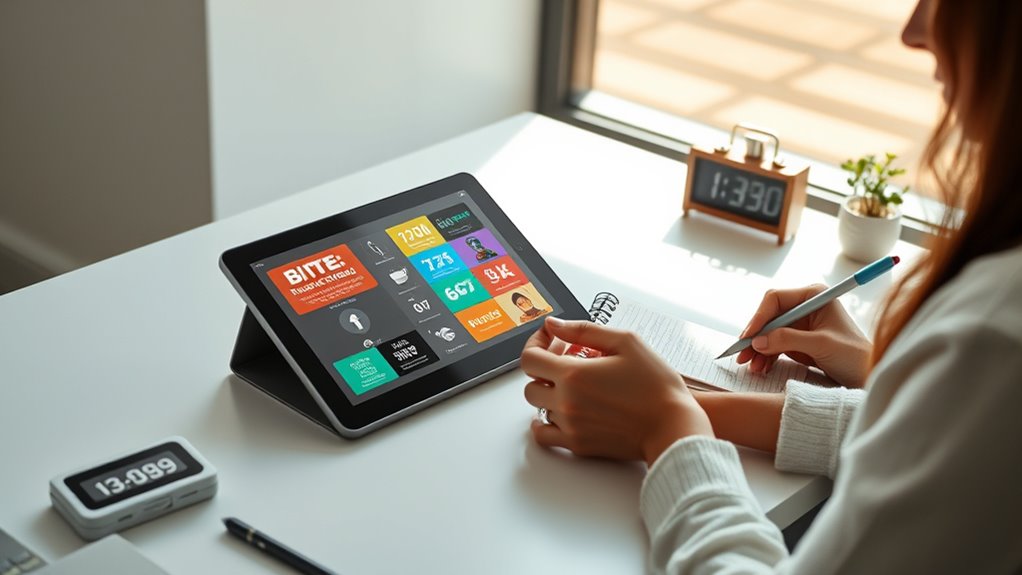
Incorporating micro-learning into your daily routine becomes easier when you identify small pockets of time throughout your day. Use these moments—commutes, lunch breaks, or waiting periods—to engage with quick lessons. To boost learning retention, choose focused topics that reinforce your goals. Applying engagement strategies like interactive quizzes or visuals can keep you motivated and improve understanding. Set aside a specific time each day for micro-learning, making it a habit. Keep lessons short—just a few minutes—so they fit seamlessly into your schedule. Consistency is key; even brief daily sessions accumulate over time. By intentionally carving out these moments and using proven engagement tactics, you’ll integrate micro-learning naturally, enhancing your knowledge without disrupting your routine. Additionally, aligning micro-learning sessions with your overall growth strategy ensures you achieve long-term success efficiently.
Frequently Asked Questions
How Does Micro-Learning Compare to Traditional Classroom Education?
When comparing micro-learning to traditional classroom education, you’ll find micro-learning enhances learning retention through focused, bite-sized lessons crafted with effective instructional design. It allows you to quickly grasp key concepts and apply them immediately, unlike lengthy lectures. This approach suits busy schedules and reinforces knowledge through repetition. Overall, micro-learning makes education more flexible and engaging, helping you retain information better than traditional methods that often overwhelm with extensive content.
Can Micro-Learning Replace Comprehensive Training Programs?
You might wonder if micro-learning can replace extensive training programs. While micro-learning boosts engagement strategies and enhances skill retention through focused, brief lessons, it often lacks the depth of traditional programs. For complex skills, it works best as a supplementary tool. However, for quick updates or reinforcement, it’s highly effective. So, it’s not a full replacement but a valuable addition to your overall training approach.
What Subjects Are Best Suited for Micro-Learning Formats?
You might think complex subjects need hours of study, but ironically, micro-learning makes bite-sized content perfect for quick mastery. Subjects like soft skills, compliance, or product knowledge thrive in short lessons because they’re easily digestible and immediately applicable. You’ll find that even technical skills can benefit from micro-learning’s focused approach. So, don’t underestimate the power of quick, engaging lessons—sometimes, less really is more for effective learning.
How Do Learners Stay Motivated With Short Lessons?
You can stay motivated with short lessons by using effective engagement strategies, like interactive quizzes and instant feedback, which keep you involved. Motivation techniques such as setting clear goals and rewarding progress help maintain your focus. Break lessons into manageable chunks, making learning feel achievable. Remember, the immediate sense of accomplishment from small wins encourages you to keep going, boosting your overall motivation to learn continuously.
What Research Supports the Effectiveness of Micro-Learning?
You might be surprised to learn that micro-learning enhances cognitive retention by up to 80%. Research shows that short, focused lessons improve learning flexibility, allowing you to adapt quickly and retain information longer. This approach taps into how your brain processes and stores knowledge efficiently, making learning more effective. The evidence clearly supports micro-learning’s ability to boost engagement and long-term understanding, helping you learn smarter and faster.
Conclusion
Micro-learning transforms education by making lessons quick and impactful. Did you know that learners retain 50% more information when lessons are brief and focused? By incorporating 5-minute lessons into your routine, you maximize engagement and retention without overwhelming yourself. Start small, use the right tools, and watch how these short sessions boost your understanding and productivity. Embrace micro-learning today—because sometimes, less truly is more for lasting impact.









